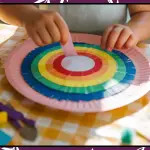Join Our Newsletter for Cozy Home Inspiration, Family Fun, and Delicious Recipes Every Week
12 Stunning Basement Flooring Ideas
When I wanted to design my basement for my two kids, I had a vision: a cozy space where they could play and chill safely. But the moment we got to the basement flooring, I hit a wall of conflicting suggestions.
Everyone, from contractors to flooring reps, warned me against using hardwood like we have upstairs. Moisture, warping, and expensive repairs haunted every suggestion. With 3,500 sq. ft. to cover and a high-end home build in progress, I felt stuck between wanting something beautiful and needing something practical. Was luxury vinyl plank (LVP) really the only option?
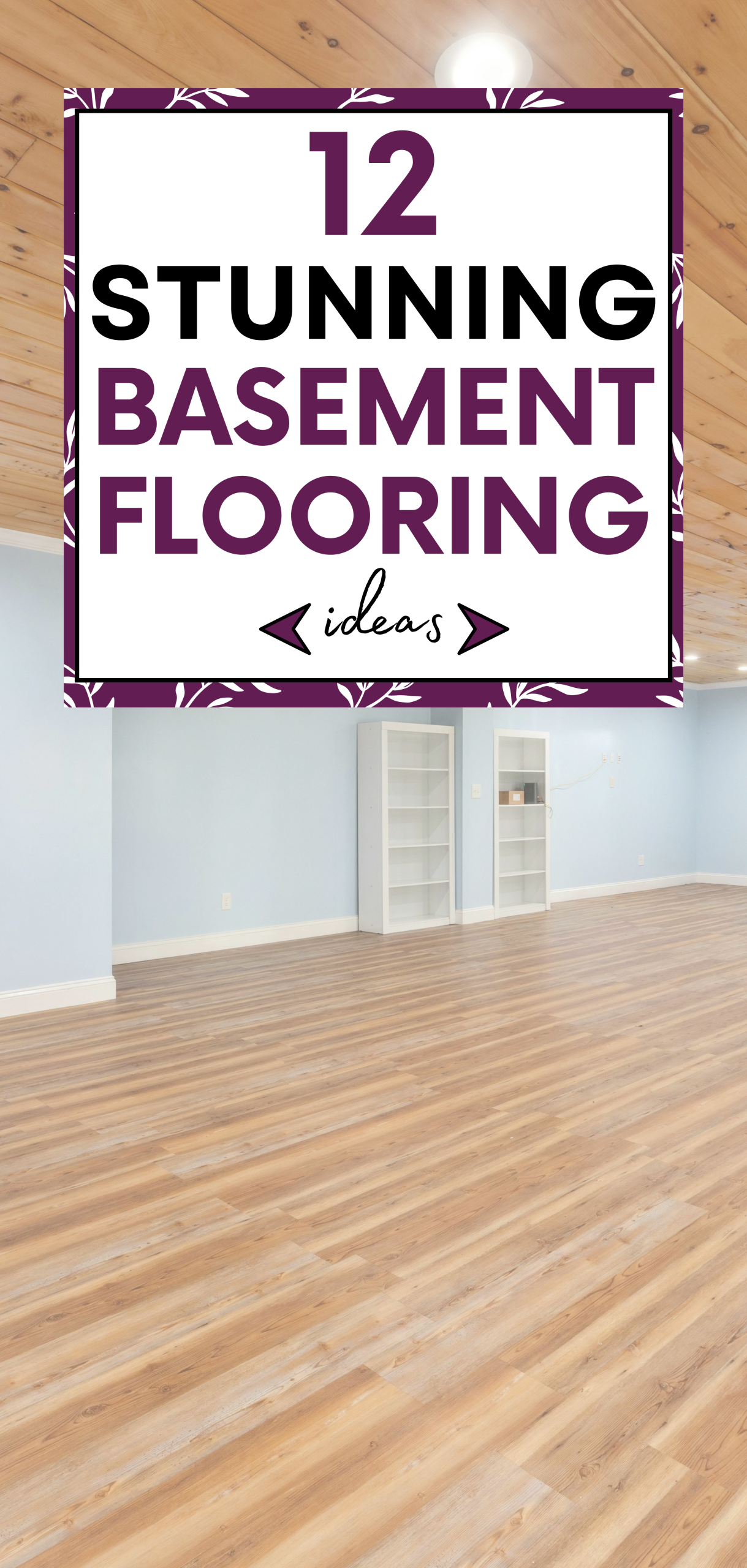
Turns out, the world of basement flooring is bigger than I thought. While LVP has strong waterproofing and an easy install going for it, not all products are made equal.
We explored engineered wood sealed with a proper vapor barrier, tiles, and even polished concrete. But each came with its own trade-offs, either in warmth, cost, or comfort.
And after talking to other homeowners who regretted going too cheap or too rigid, I realized choosing the right underlayment and prepping the slab made more difference than I expected. The wrong prep could ruin even the best product. So we looked at options like Karastan and Flooret, high-end LVP and laminates with durable cores, beautiful finishes, and solid warranties.
In the end, we chose a premium basement flooring solution that made the space feel just as welcoming as the upstairs, without the risk. A well-prepped slab, a solid vapor barrier, and carefully chosen flooring transformed our basement into the perfect kids‘ retreat.
Soft underfoot, warm in winter, and tough enough for playdates and the occasional spilled juice box. It may have started as a flooring dilemma, but it turned into one of the best decisions of the whole build. And the best part? The kids love it, and so do we.
12. Engineered Hardwood Flooring
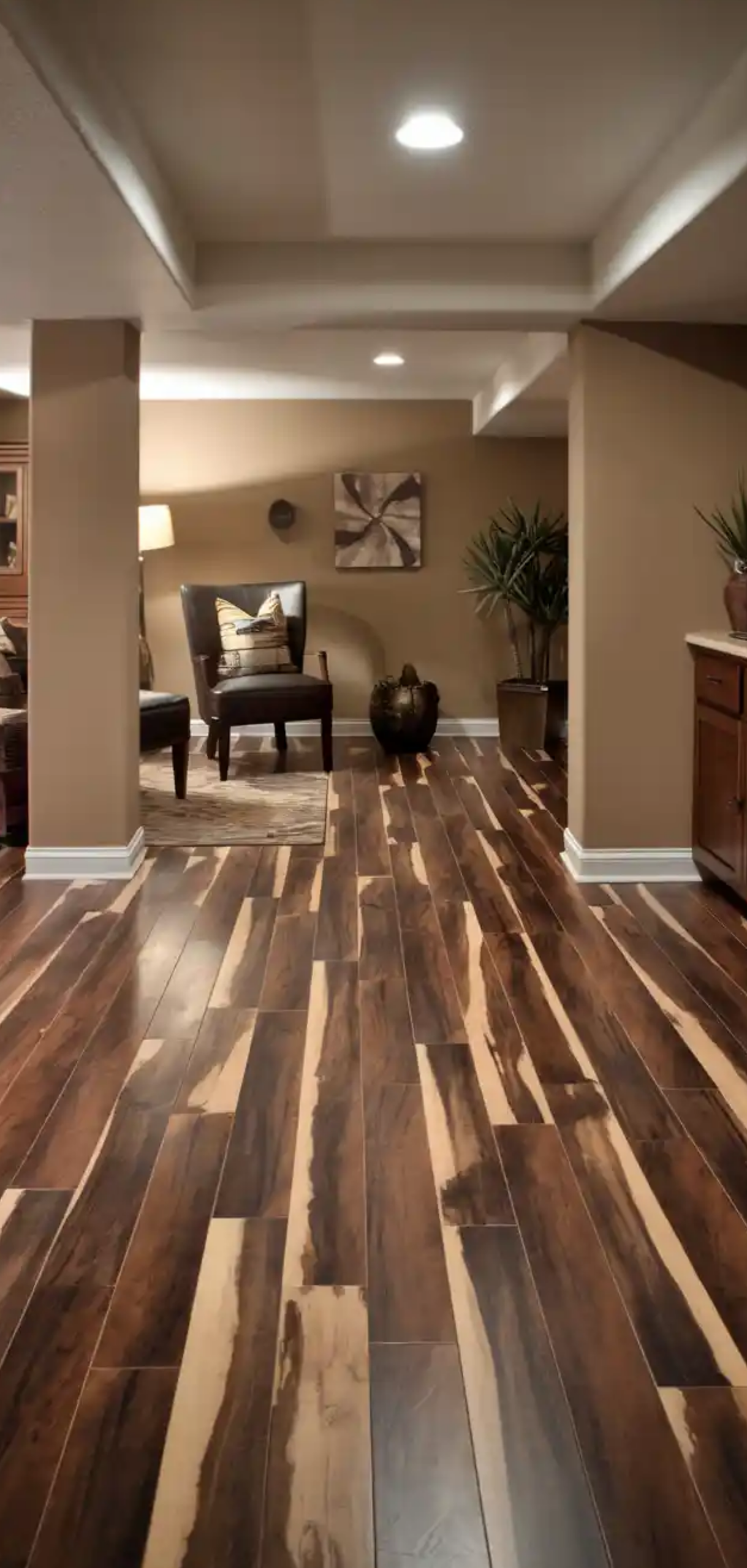
Engineered hardwood combines the beauty of natural wood with added stability for basement conditions.
Basement Flooring Tips:
- Choose moisture-resistant engineered hardwood to prevent warping or buckling.
- Opt for wide-plank styles to give the basement an airy, open feel.
- Consider a matte or satin finish to enhance the wood’s natural beauty while resisting wear.
Benefits:
- Adds warmth and elegance to your basement.
- Long-lasting and relatively easy to maintain.
- It can mimic expensive hardwood varieties at a lower cost.
11. Luxury Vinyl Plank (LVP) Flooring
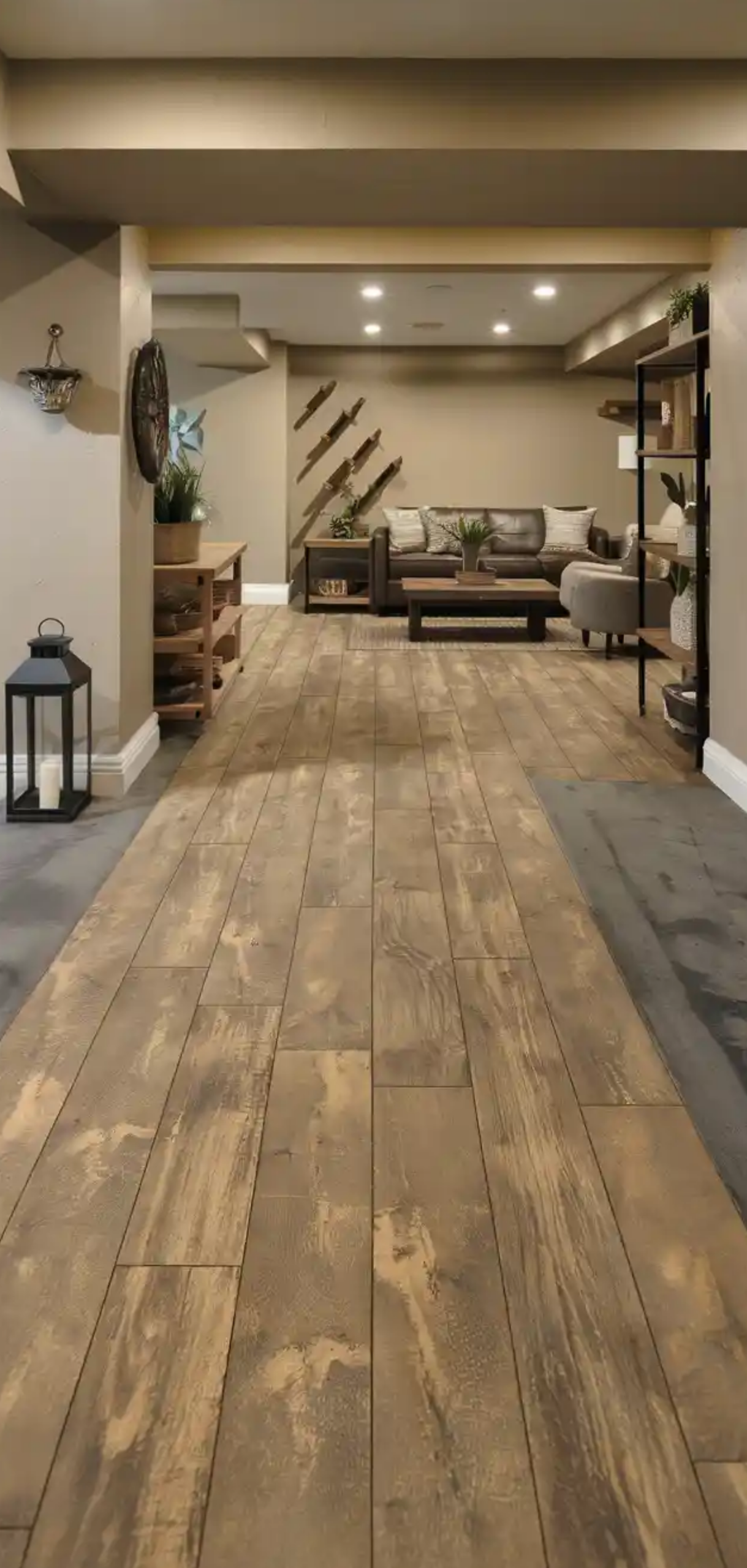
LVP flooring is a popular choice due to its waterproof nature and durability.
Basement Flooring Tips:
- Go for a wood-look vinyl plank for a sleek and realistic aesthetic.
- Ensure the LVP has a thick wear layer for extra protection.
- Installation is easy with click-lock technology, which makes it DIY-friendly.
Benefits:
- Waterproof and resistant to spills, making it perfect for basements.
- Low-maintenance with easy-to-clean surfaces.
- Available in various designs, including wood, stone, and tile.
10. Tile Flooring
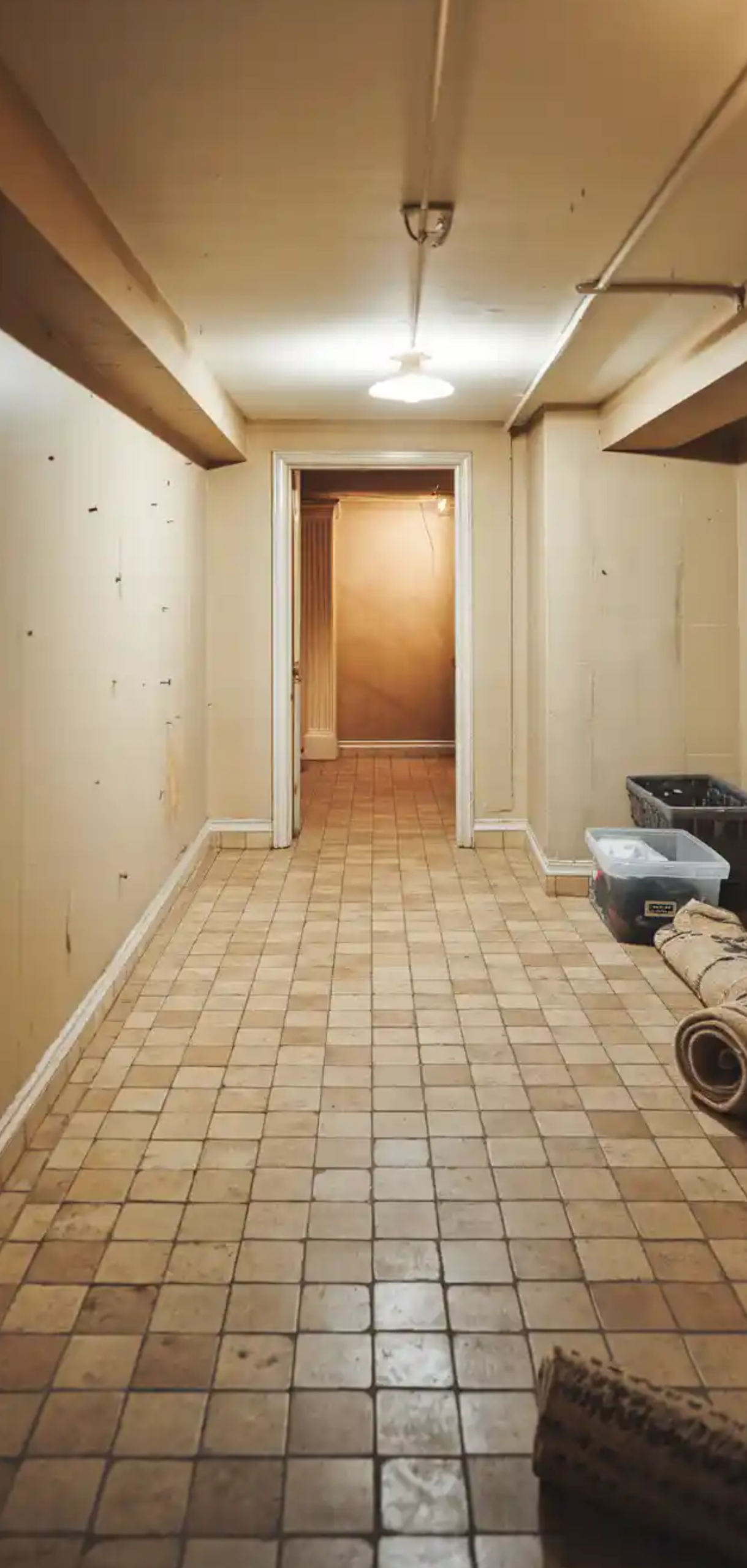
Ceramic and porcelain tiles are an excellent choice for basements prone to humidity.
Basement Flooring Tips:
- Use grout with a water-resistant sealant to prevent moisture seepage.
- Choose large-format tiles to minimize grout lines, which can collect dirt.
- Install radiant heating under the tiles to ensure comfort during colder months.
Benefits:
- Durable and moisture-resistant.
- Can mimic the look of natural stone or wood.
- Easy to clean and maintain, perfect for high-traffic areas.
9. Concrete Flooring with Epoxy Coating
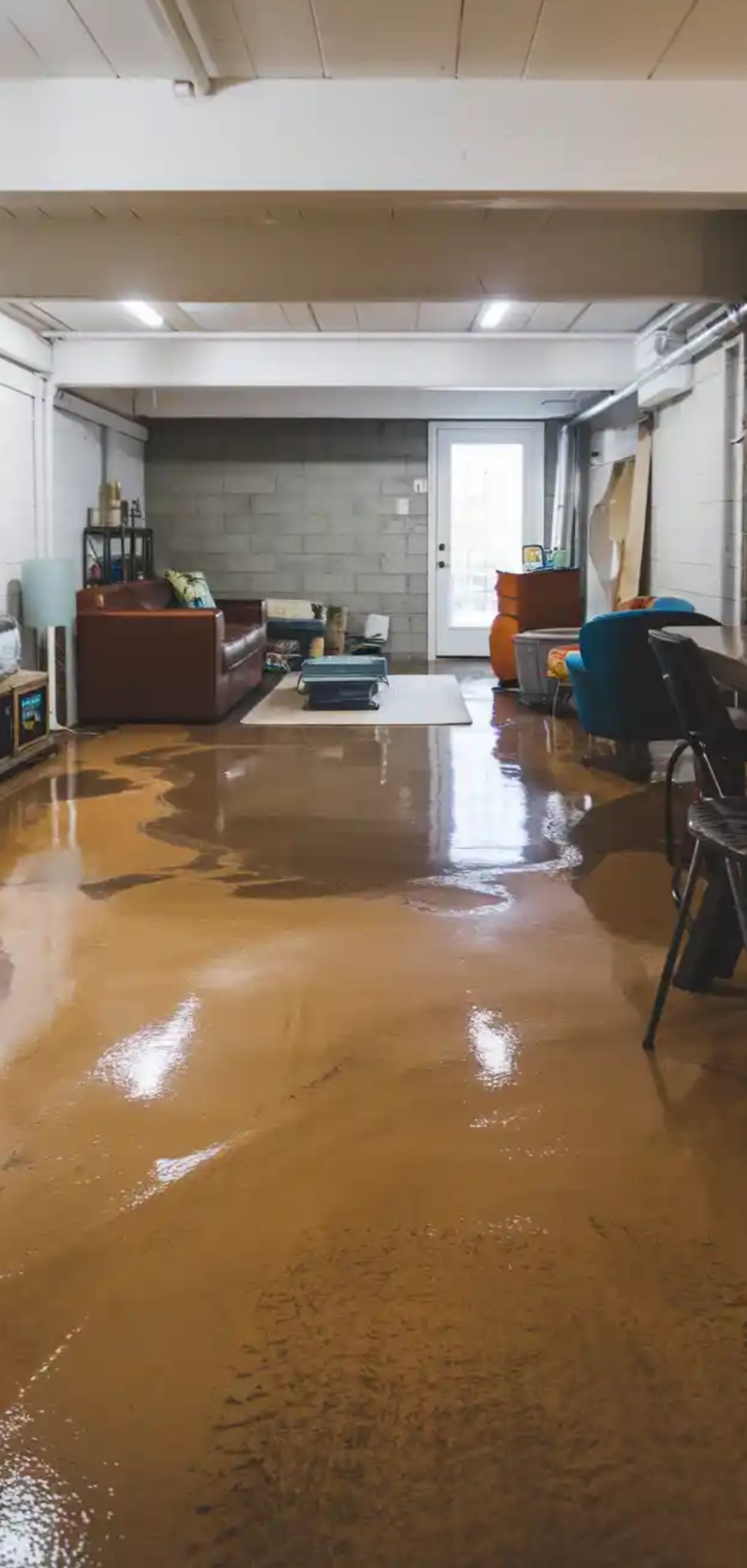
Concrete floors are a solid, low-maintenance option that pairs well with various basement functions.
Basement Flooring Tips:
- Apply an epoxy coating to make the concrete durable and easy to clean.
- Choose a glossy or matte finish based on the desired look.
- Add decorative aggregates, like glass beads or colored chips, for a more modern finish.
Benefits:
- Extremely durable and low-maintenance.
- Ideal for home gyms, workshops, and other high-traffic areas.
- Can be personalized with various finishes and designs.
8. Cork Flooring
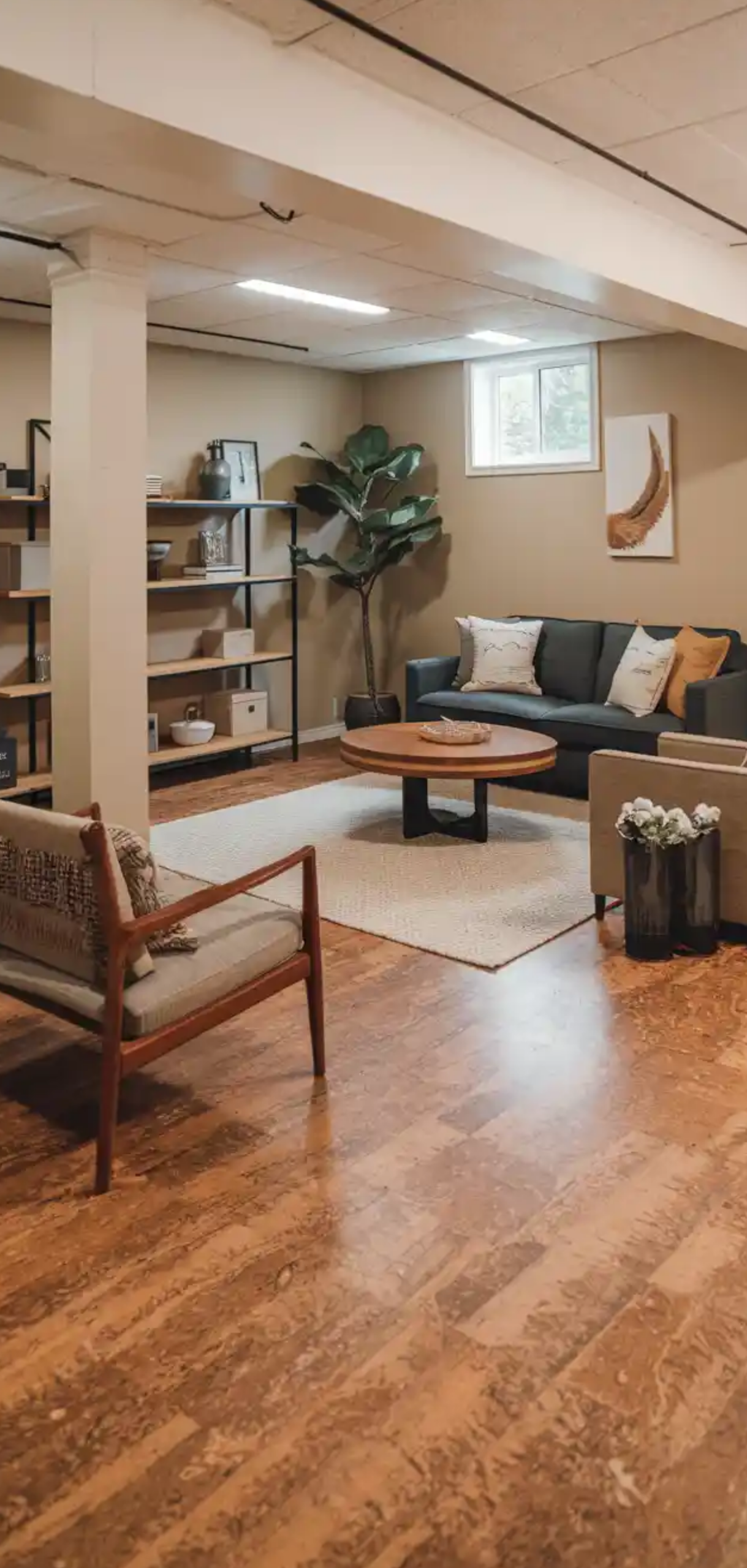
Cork flooring is a sustainable and comfortable option for basement spaces.
Basement Flooring Tips:
- Ensure that the cork flooring is sealed to prevent water damage.
- Use a soundproof underlayment to minimize noise.
- Choose a light or medium tone for a warm, welcoming ambiance.
Benefits:
- Soft and comfortable underfoot, ideal for kids’ play areas.
- Naturally insulating, helping with temperature regulation.
- Eco-friendly and renewable.
7. Rubber Flooring
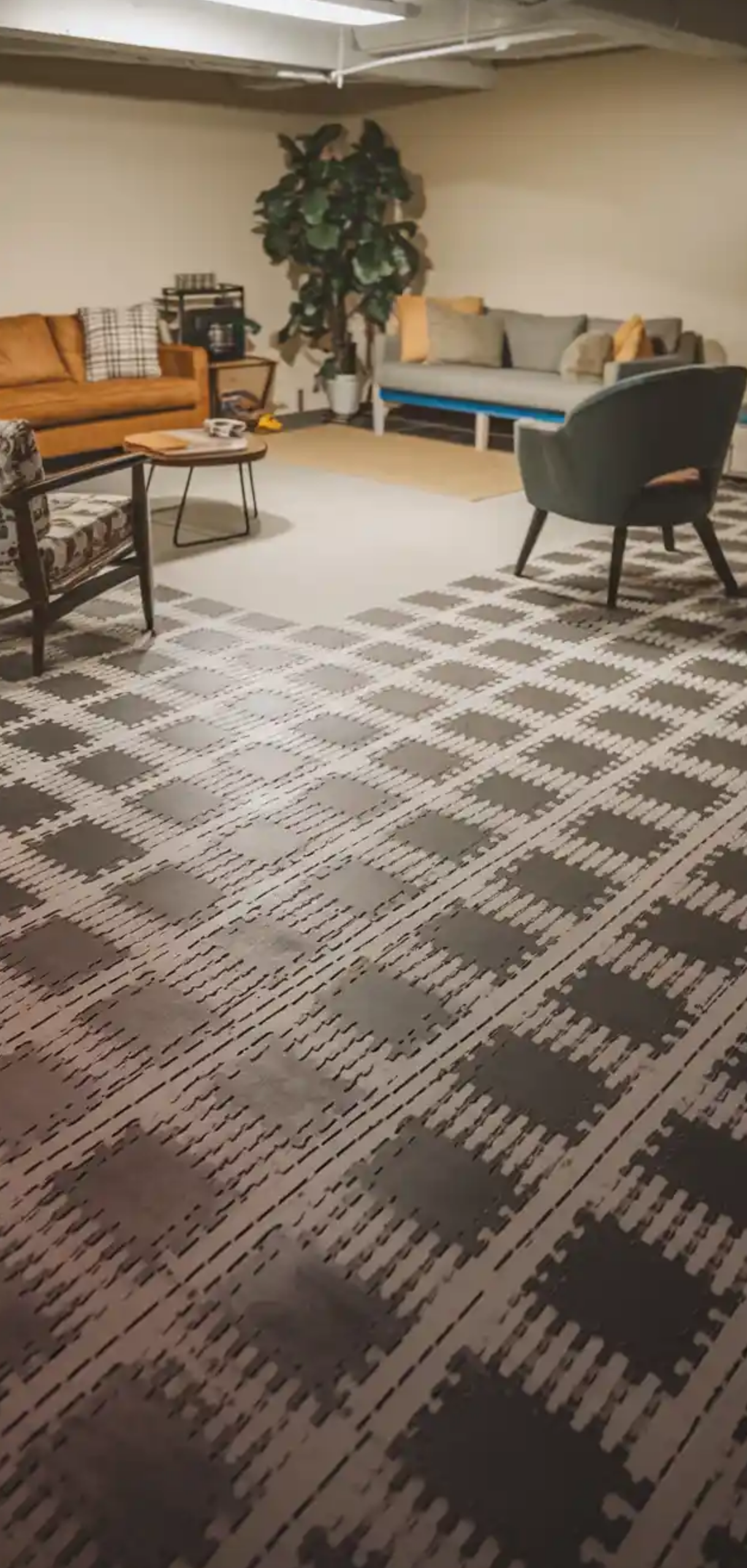
Rubber flooring is both durable and slip-resistant, making it an excellent option for active basement spaces.
Basement Flooring Tips:
- Ideal for home gyms or playrooms where safety is a priority.
- Opt for interlocking rubber tiles for easy installation and replacement.
- Choose a textured surface to prevent slips, especially in areas with high foot traffic.
Benefits:
- Durable, slip-resistant, and shock-absorbing.
- Easy to maintain and clean.
- Available in multiple colors to suit different design preferences.
6. Carpet Tiles
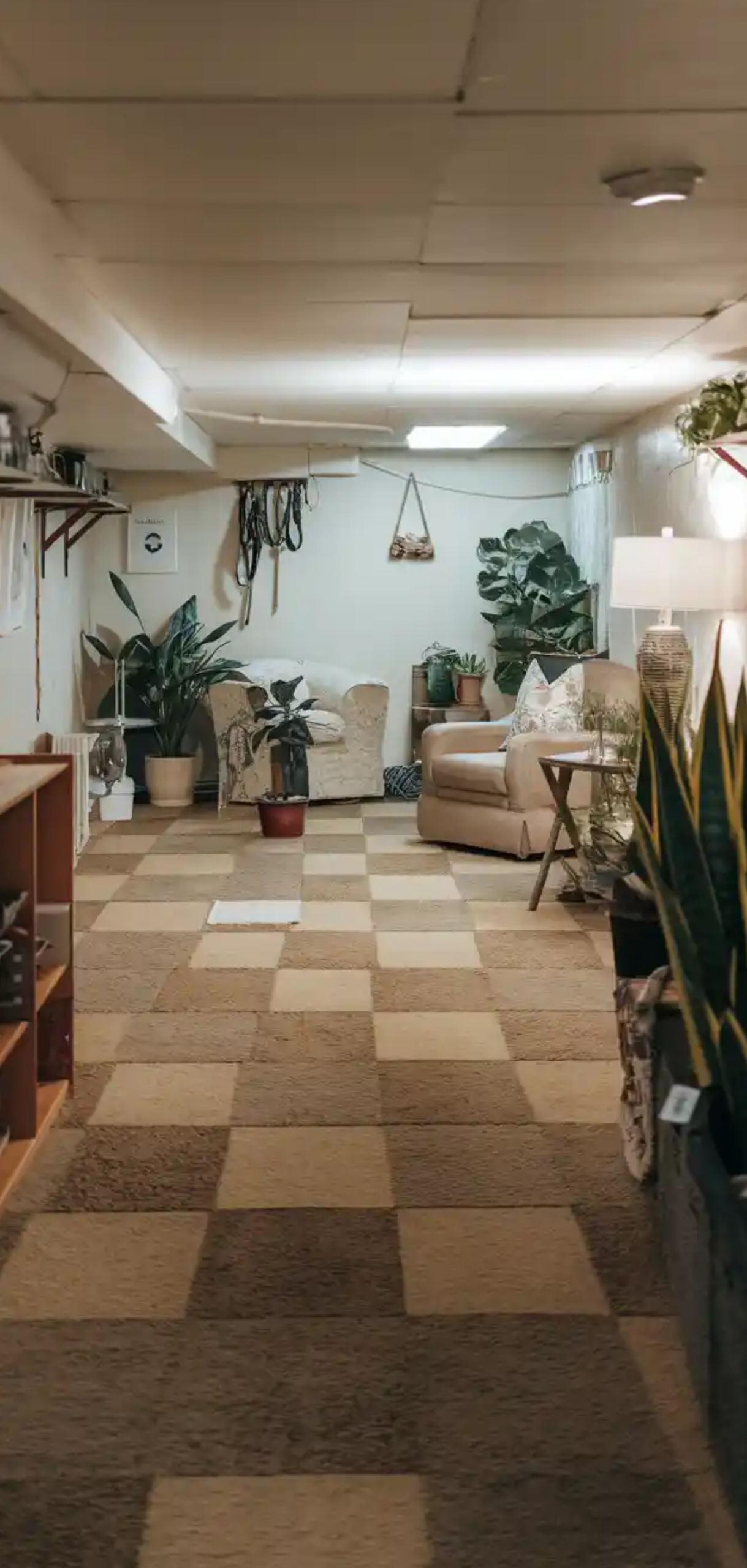
Carpet tiles offer versatility and ease of maintenance for basement flooring.
Basement Flooring Tips:
- Choose carpet tiles with moisture-resistant backing to avoid mold growth.
- Mix and match patterns and colors to create a unique look.
- Consider installing them in modular sections for easier repair if needed.
Benefits:
- Soft and comfortable, ideal for family rooms or home theaters.
- Easy to replace individual tiles in case of stains or damage.
- Available in a variety of designs and textures.
5. Bamboo Flooring
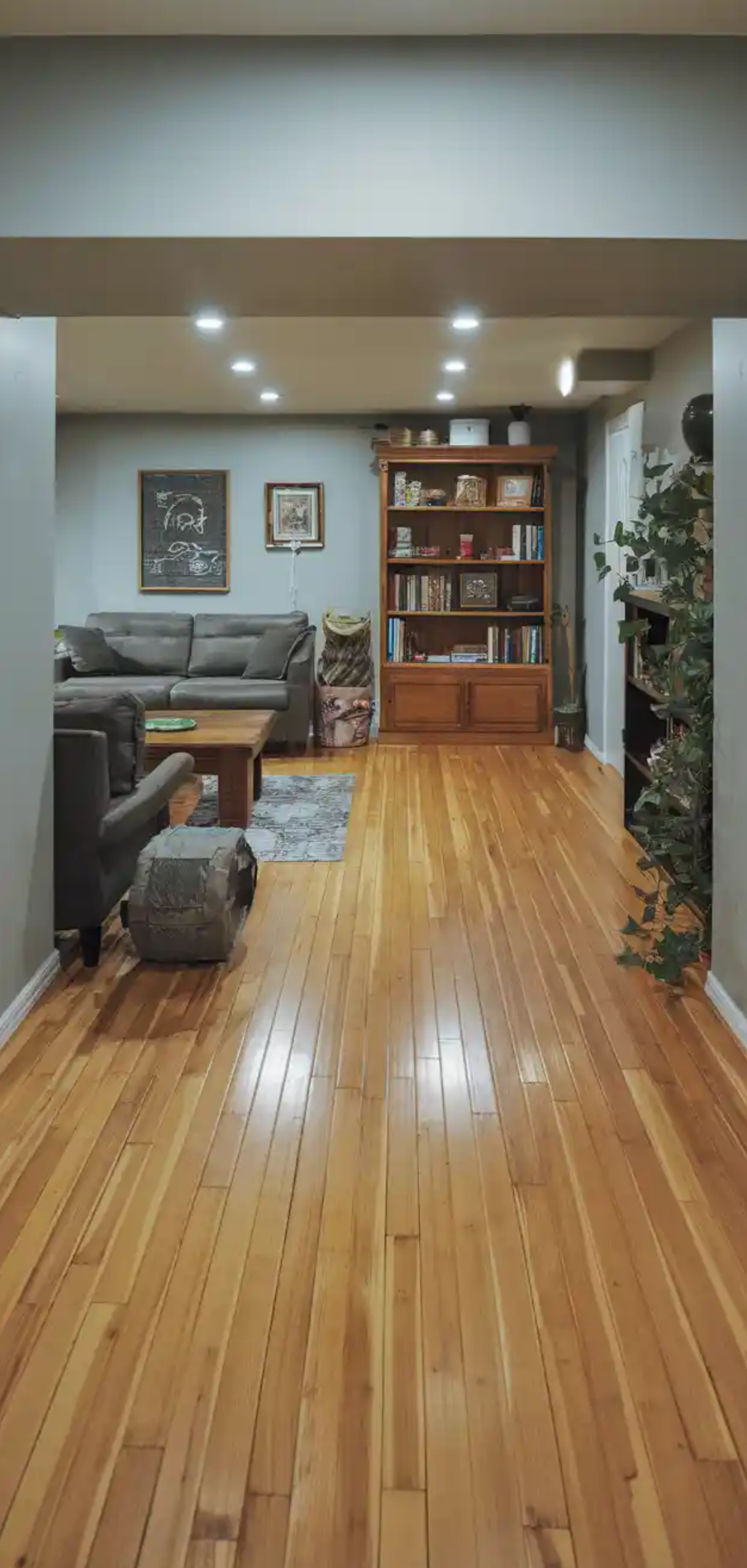
Bamboo is a sustainable alternative to hardwood that performs well in basement environments.
Basement Flooring Tips:
- Choose strand-woven bamboo for greater durability and resistance to moisture.
- Seal the flooring with a high-quality finish to protect it from basement humidity.
- Install bamboo flooring with a floating floor system for quicker, easier installation.
Benefits:
- Eco-friendly and durable.
- Adds a sleek, contemporary look to your basement.
- Naturally resistant to pests and moisture when treated properly.
4. Laminate Flooring
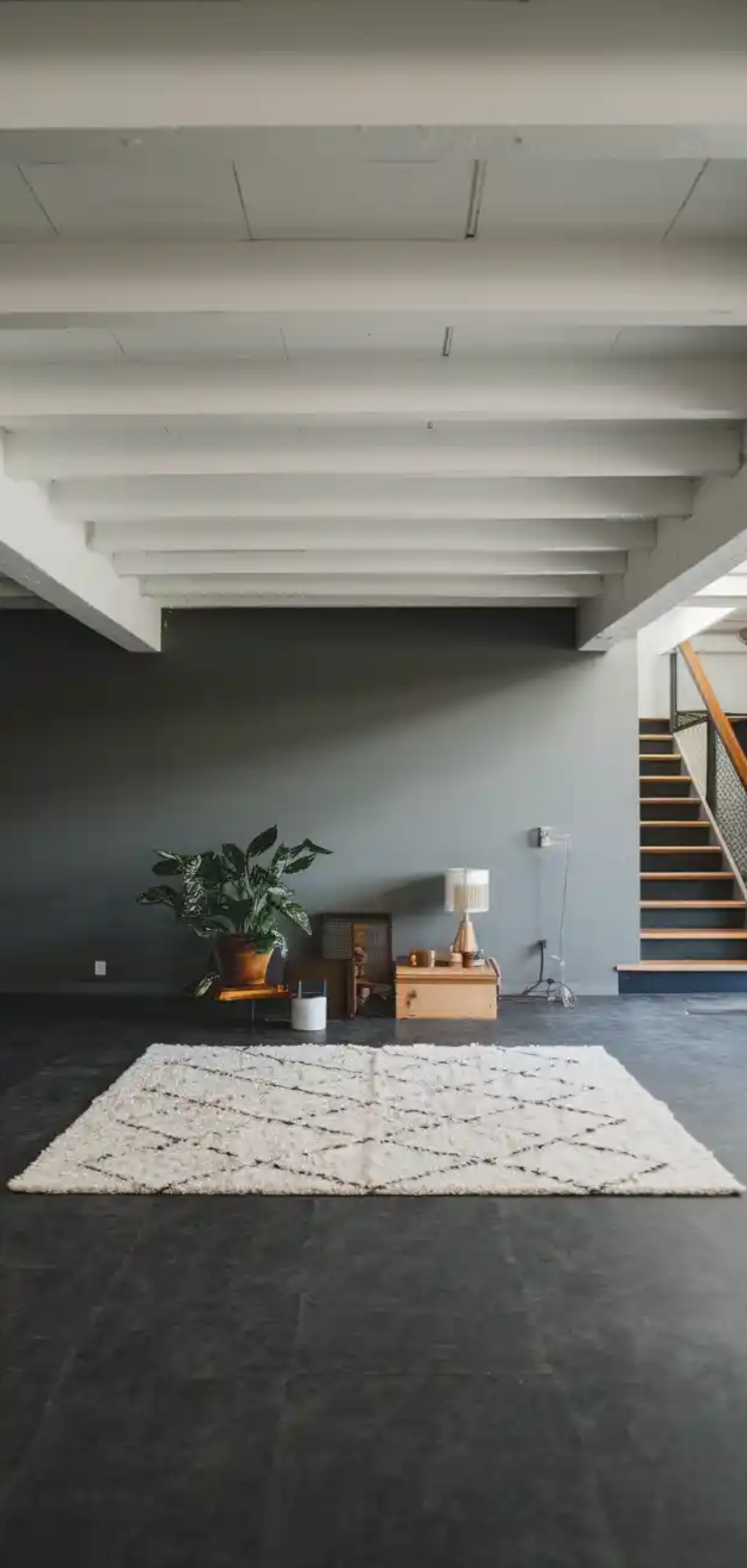
Laminate is an affordable and stylish alternative to hardwood flooring.
Basement Flooring Tips:
- Choose laminate flooring with a moisture-resistant core to combat basement humidity.
- Look for options with a high AC rating to ensure durability.
- Opt for a wood-look laminate that mimics natural wood at a fraction of the cost.
Benefits:
- Affordable and available in a variety of designs.
- Easy to install, often with a click-lock installation system.
- Durable and resistant to scratching and fading.
3. Linoleum Flooring
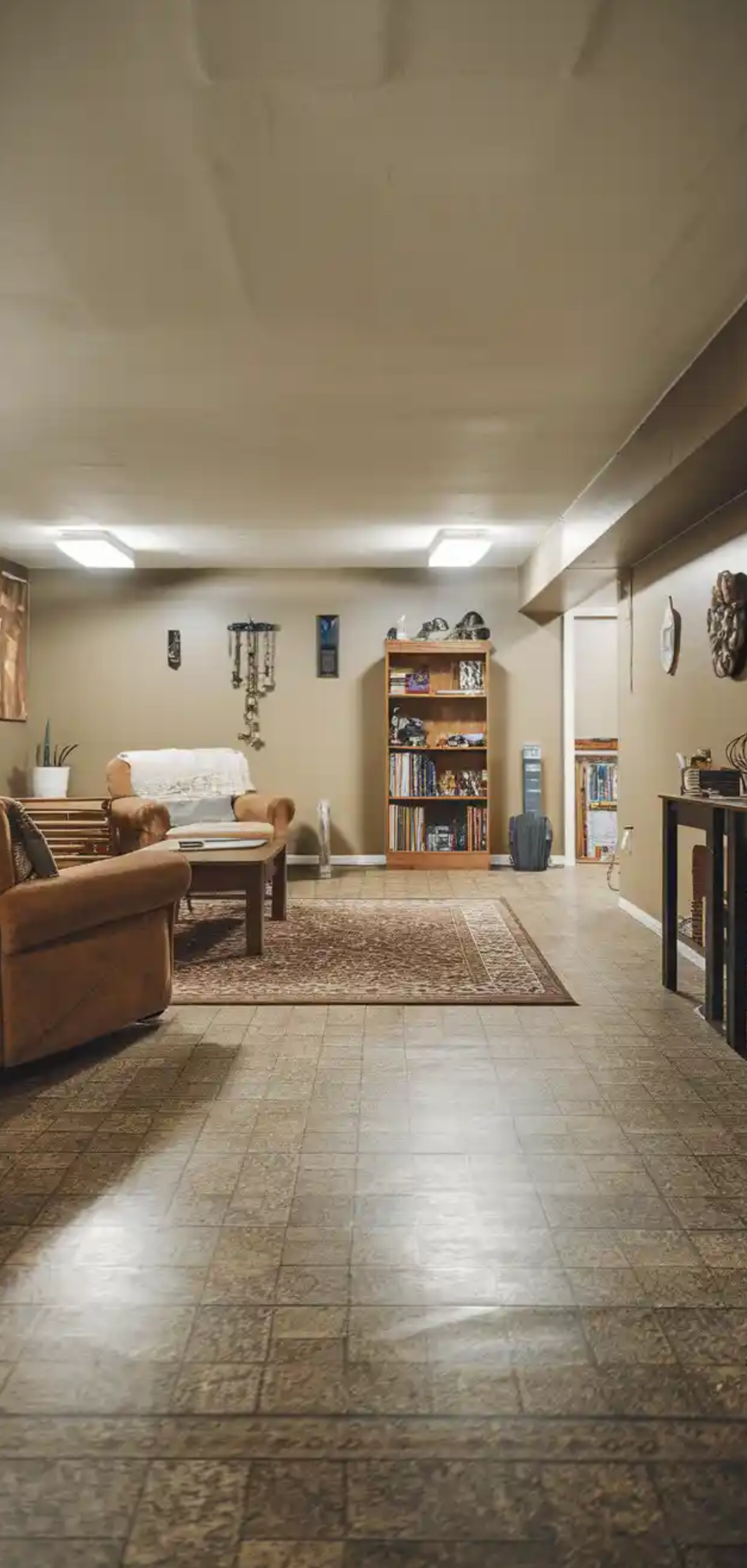
Linoleum is an eco-friendly, durable, and budget-friendly option for basement flooring.
Basement Flooring Tips:
- Ensure the linoleum is installed with a moisture-resistant backing to prevent damage.
- Choose a patterned or textured linoleum for visual interest.
- Consider installing a cork underlayment for added comfort and soundproofing.
Benefits:
- Sustainable and made from natural materials.
- Easy to clean and maintain.
- Available in a variety of colors and patterns.
2. Wood-Look Porcelain Tile
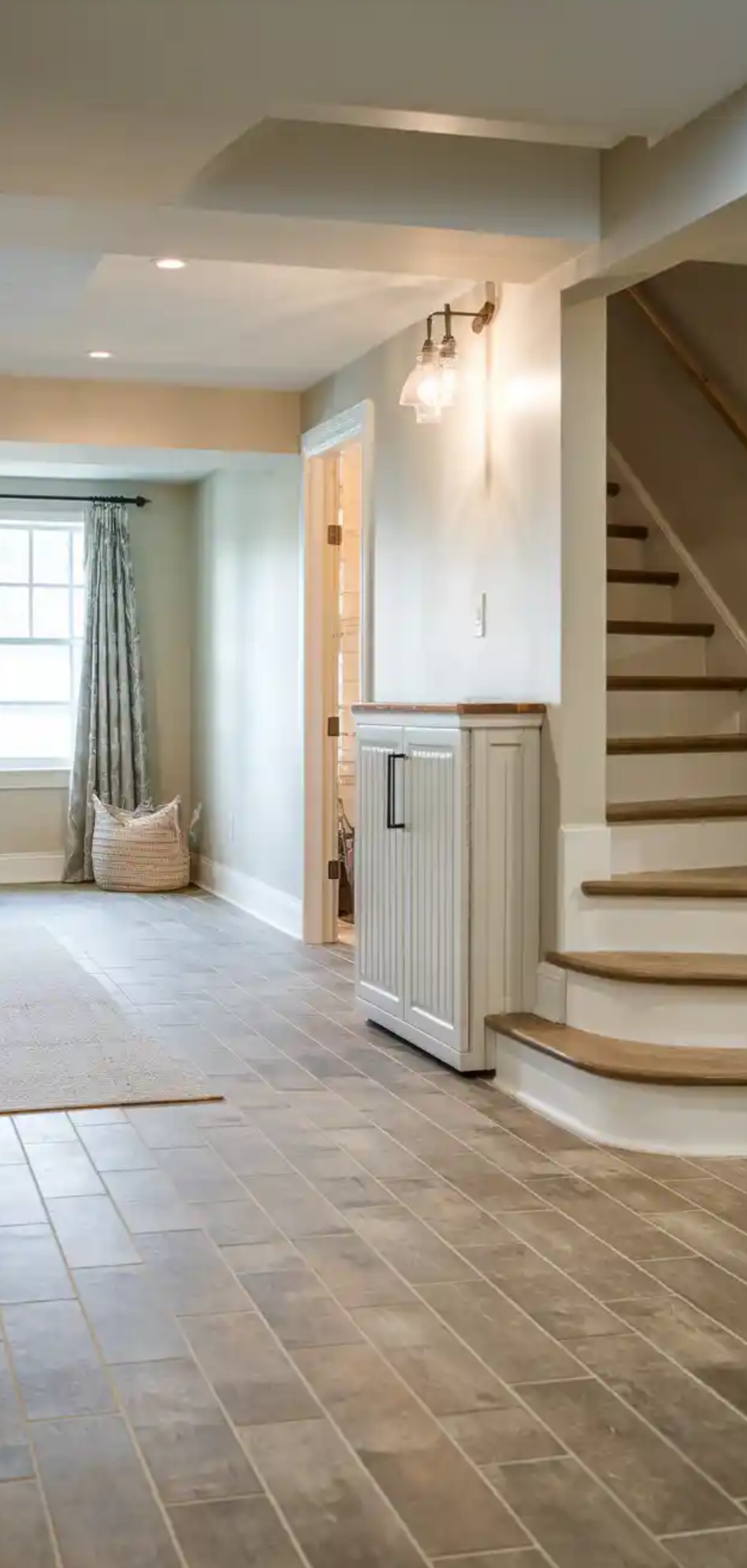
For those who love the look of hardwood but need a more durable solution, wood-look porcelain tiles are a fantastic choice.
Basement Flooring Tips:
- Ensure the tiles are installed with a moisture-resistant grout to prevent damage.
- Use large-format tiles for a more streamlined, less grouted look.
- Combine the tiles with underfloor heating for extra comfort.
Benefits:
- Offers the beauty of wood with the durability of porcelain.
- Resistant to moisture, making it perfect for basement settings.
- Low maintenance and highly durable.
1. Pebble Flooring
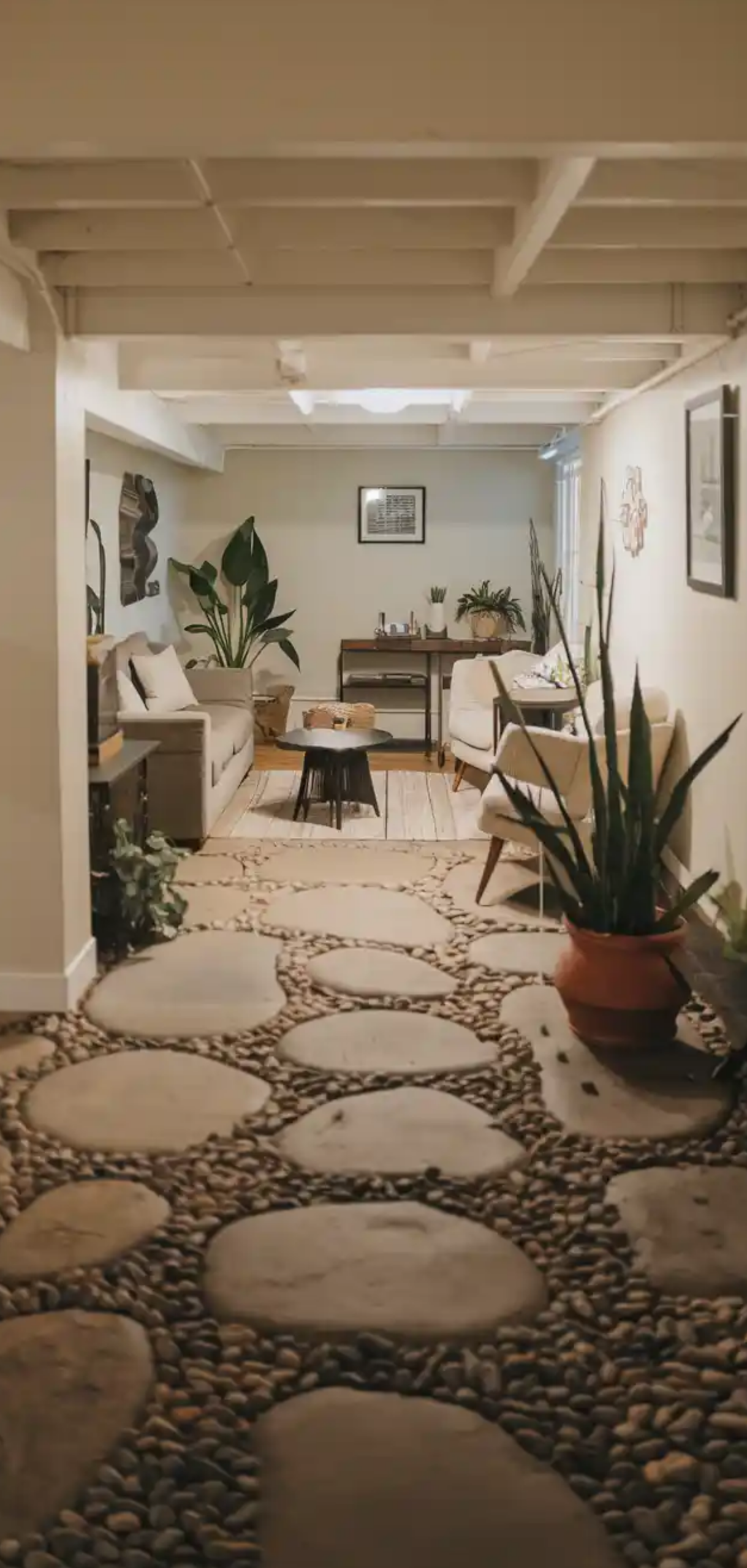
For a natural, unique aesthetic, pebble flooring provides an organic, textured look.
Basement Flooring Tips:
- Use pebbles with smooth, rounded edges to ensure comfort and safety.
- Install pebble flooring in smaller sections or accent areas, as it can be overwhelming in large spaces.
- Seal the pebbles with a waterproof finish to ensure they last and prevent discoloration.
Benefits:
- Offers a natural, earthy aesthetic.
- Durable and water-resistant.
- Adds texture and interest to the floor.
Conclusion
Selecting the right basement flooring is crucial for ensuring a functional, stylish, and comfortable space. Each of the 12 ideas listed offers unique advantages based on your basement’s purpose, moisture levels, and overall design aesthetic. From moisture-resistant options like engineered hardwood and vinyl planks to natural choices like cork and bamboo, there’s something for every style and budget.



